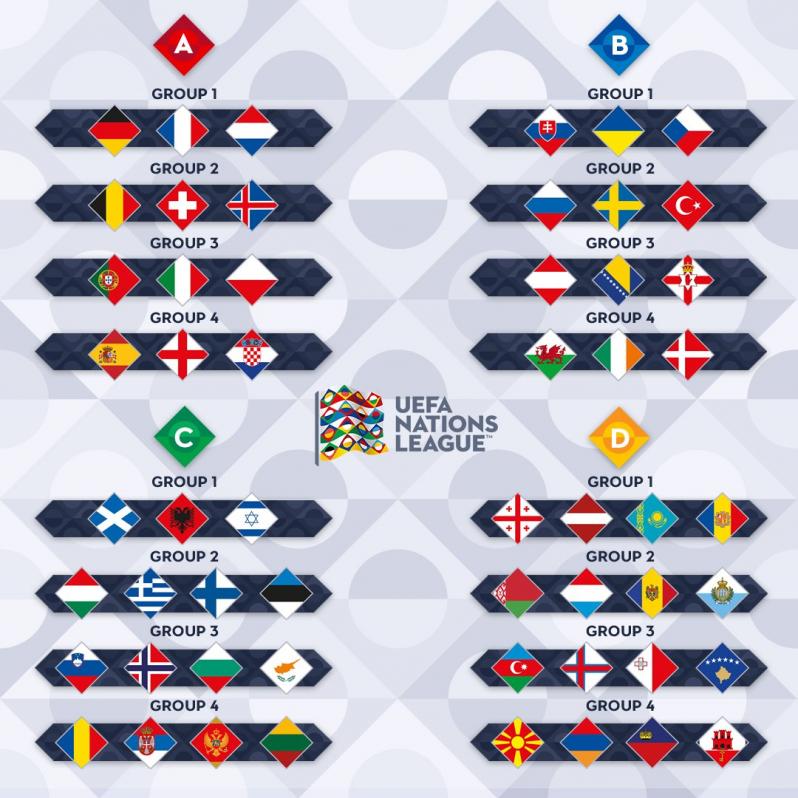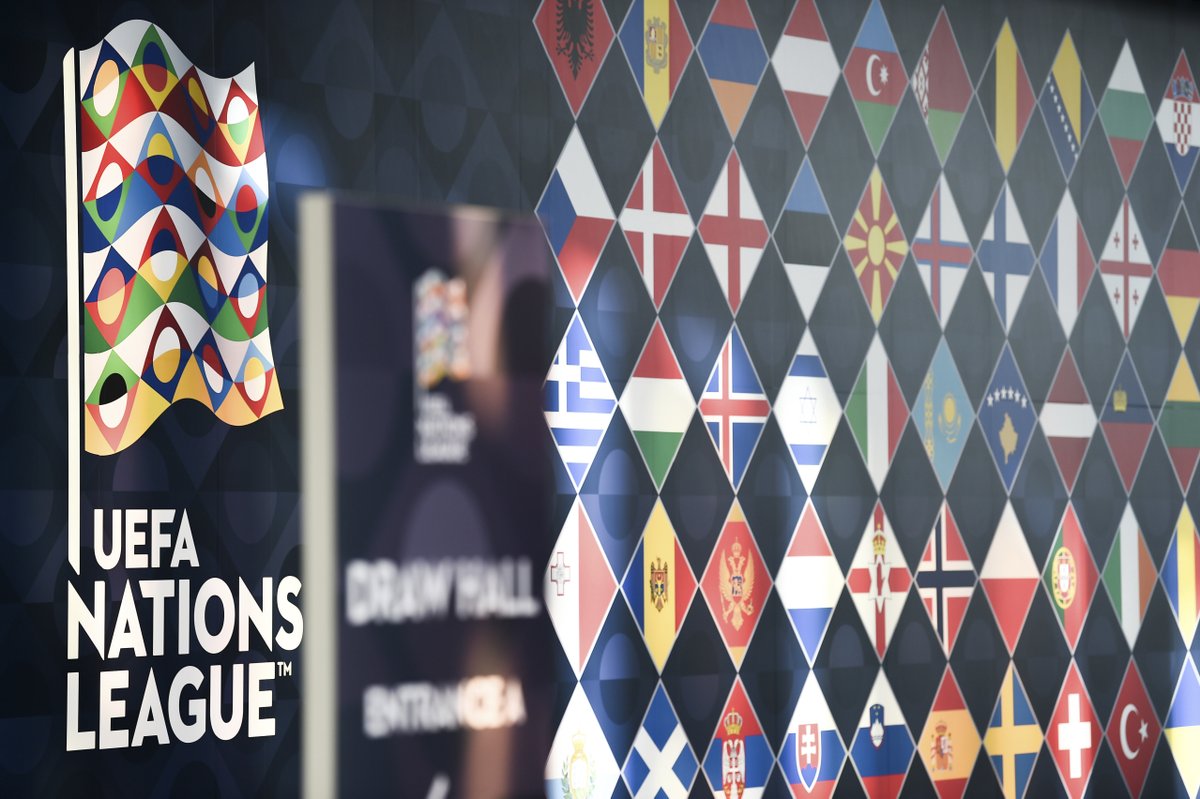Football fans, gather 'round because the UEFA Nations League schedule is about to take center stage in the world of sports. Whether you're a die-hard supporter or just dipping your toes into the football scene, the UEFA Nations League has something for everyone. It's not just a tournament; it's a celebration of talent, strategy, and sheer passion. So, buckle up and get ready to dive deep into the thrilling world of UEFA Nations League!
The UEFA Nations League is no ordinary competition. It's a league that brings together the best national teams from across Europe, creating a spectacle that football enthusiasts eagerly anticipate. This isn't your run-of-the-mill friendly match; it's a battle of prestige, where every game counts and every point matters. Fans all over the globe are glued to their screens, eagerly following the UEFA Nations League schedule to catch every moment of the action.
As we delve deeper into this guide, we'll uncover the intricacies of the UEFA Nations League, from its inception to the current format, and everything in between. So, whether you're here for the stats, the drama, or just the sheer joy of watching world-class football, you're in the right place. Let's kick off this journey together!
Read also:Aruna Irani
Understanding the UEFA Nations League
What is the UEFA Nations League?
The UEFA Nations League is a competition for senior national teams of the member associations of UEFA, which is the governing body for football in Europe. Introduced in 2018, it aims to replace the numerous friendly matches that national teams previously played and to provide more meaningful fixtures. The tournament is structured in a league format, with teams divided into four leagues based on their ranking.
This format ensures that teams play against opponents of similar standing, making each game more competitive and exciting. It's not just about winning; it's about climbing the ranks, earning promotion, and avoiding relegation. The UEFA Nations League schedule is carefully crafted to ensure that every match has something at stake, keeping fans on the edge of their seats.
How Does the UEFA Nations League Work?
Alright, let's break it down. The UEFA Nations League operates on a system of promotion and relegation across four leagues: League A, B, C, and D. Each league is further divided into groups, and teams play each other home and away. At the end of the league stage, the top teams from League A compete in a knockout round to determine the champion.
But here's the twist: teams can be promoted to a higher league or relegated to a lower one based on their performance. This adds an extra layer of excitement and pressure, as teams not only strive to win but also to maintain or improve their league status. The UEFA Nations League schedule is designed to reflect these dynamics, ensuring that every match is a crucial part of the bigger picture.
The UEFA Nations League Schedule: A Breakdown
Key Dates and Fixtures
So, when exactly does the action kick off? The UEFA Nations League schedule typically spans over several months, usually starting in September and concluding in June of the following year. The exact dates can vary, but the tournament generally follows this timeline:
- September to November: The league stage, where teams play their group matches.
- March: Additional matches are sometimes scheduled to complete the league stage.
- June: The finals for League A, featuring semi-finals, a third-place match, and the final.
These dates are crucial for fans who want to plan their viewing schedule. Whether you're catching the matches live or tuning in later, knowing the UEFA Nations League schedule helps you stay on top of the game.
Read also:Ayazhan Dalabayeva
Format and Structure
The UEFA Nations League is divided into four leagues, each with its own set of rules and structure:
- League A: The top-tier league featuring the strongest national teams. Teams compete in four groups of three, with the group winners advancing to the finals.
- League B: The second-tier league, where teams also compete in four groups of three. The group winners are promoted to League A.
- League C: The third-tier league, featuring four groups of four teams. The group winners are promoted to League B, while the bottom teams are relegated to League D.
- League D: The bottom-tier league, consisting of four groups of four teams. The group winners are promoted to League C.
This structure ensures that every team has a chance to rise through the ranks or face the challenge of relegation, making the UEFA Nations League schedule a thrilling ride for all involved.
Why the UEFA Nations League Matters
More Than Just a Tournament
The UEFA Nations League is more than just a competition; it's a platform for national teams to showcase their talent and improve their ranking. It offers a chance for lesser-known teams to compete against stronger opponents, gaining valuable experience and exposure. For top-tier teams, it's an opportunity to test their mettle against peers of similar standing.
Moreover, the UEFA Nations League schedule provides a pathway to the UEFA European Championship (Euro). Teams that perform well in the Nations League can secure a spot in the Euro through the play-offs, adding another layer of importance to the tournament.
Impact on National Teams
The impact of the UEFA Nations League on national teams cannot be overstated. It allows coaches to experiment with new strategies and players, giving emerging talents a chance to shine on an international stage. For fans, it means more high-quality matches throughout the year, keeping the excitement alive even outside major tournaments like the World Cup or Euro.
Top Teams to Watch
League A Contenders
In League A, the competition is fierce, with powerhouse teams like France, Spain, Italy, and England vying for the top spot. These teams have a history of excellence and are always in the mix for major titles. Keep an eye on their performances throughout the UEFA Nations League schedule, as they could be the ones lifting the trophy at the end of the season.
Dark Horses in Lower Leagues
While League A grabs all the headlines, don't sleep on the potential dark horses in Leagues B, C, and D. Teams like Wales, Scotland, and Iceland have shown in the past that they can compete with the best. With the right combination of talent and strategy, these teams could make a significant impact, challenging the status quo and proving that the UEFA Nations League is truly a tournament of opportunity.
Stats and Records
Notable Achievements
Since its inception, the UEFA Nations League has seen some remarkable achievements. Portugal was the first-ever champion, winning the inaugural tournament in 2019. France followed suit in 2021, showcasing their dominance on the international stage. These victories are not just about lifting trophies; they represent the hard work, dedication, and skill of the players and coaching staff involved.
Player Performances
Individual player performances also play a crucial role in the success of national teams. Stars like Cristiano Ronaldo, Kylian Mbappé, and Harry Kane have left their mark on the UEFA Nations League, scoring crucial goals and delivering standout performances. Their contributions are a testament to the high level of talent on display throughout the tournament.
How to Follow the UEFA Nations League
Where to Watch
Wondering where to catch all the action? The UEFA Nations League is broadcast on various platforms around the world. In Europe, matches are typically shown on channels like ITV and RTÉ, while international audiences can tune in through platforms like ESPN and beIN Sports. Additionally, many matches are available to stream online, making it easier than ever for fans to follow the UEFA Nations League schedule from anywhere.
Stay Updated
Keeping up with the UEFA Nations League schedule is easier than ever with the help of social media and official UEFA channels. Follow UEFA on Twitter, Instagram, and Facebook for live updates, highlights, and behind-the-scenes content. You can also download the official UEFA app for the latest news, scores, and fixtures right at your fingertips.
Future of the UEFA Nations League
Expansion and Growth
As the UEFA Nations League continues to grow in popularity, there's talk of expanding the tournament to include more teams and fixtures. This could mean even more exciting matches and opportunities for national teams to showcase their skills. The UEFA Nations League schedule might evolve to accommodate these changes, ensuring that the tournament remains fresh and engaging for fans worldwide.
Innovation and Technology
Technology is also set to play a bigger role in the future of the UEFA Nations League. From enhanced broadcasting capabilities to data analytics that provide deeper insights into player and team performances, the tournament is embracing innovation to enhance the viewing experience. As we look ahead, the UEFA Nations League is poised to become an even more integral part of the international football calendar.
Conclusion
The UEFA Nations League has quickly established itself as a premier tournament in the world of football. With its unique format, exciting matches, and the opportunity for teams to rise through the ranks, it offers something for everyone. The UEFA Nations League schedule is a testament to the tournament's commitment to delivering high-quality football throughout the year.
So, whether you're a lifelong fan or new to the sport, the UEFA Nations League is a must-watch event. Dive into the action, support your favorite teams, and enjoy the spectacle that is UEFA Nations League football. Don't forget to share your thoughts, leave a comment, and explore more content on our site for all things football!
Table of Contents:


